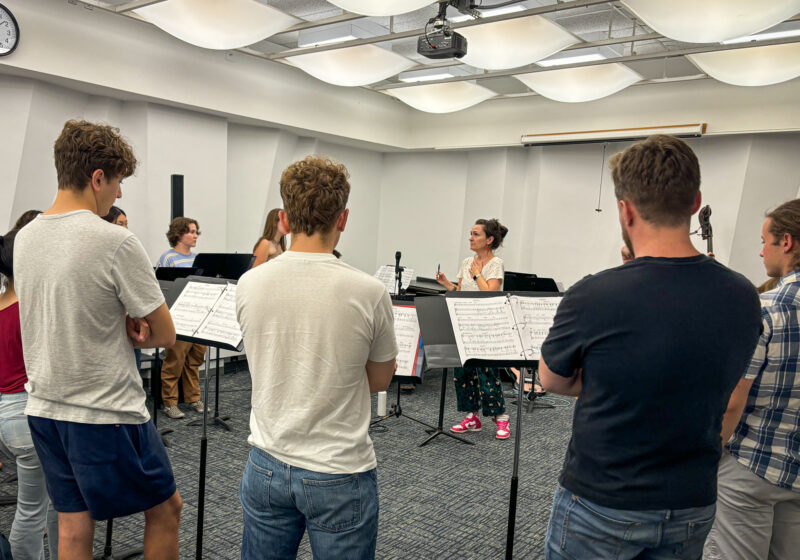Due to four students’ proactive campaigning, UR is moving toward an entirely smoke-free campus. Starting this year, smoking is prohibited in freshman dorms, and will be prohibited in all campus living areas by the summer of 2004. Currently, all common areas and academic buildings are smoke-free, and with the new policy, students will only be able to smoke if they remain 30 feet away from any building.
The four seniors, Avril Little, Kira Epstein, Tiffany Siu and Mary LeBrun were in a class called Action for Health offered by the School of Nursing, the Department of Anthropology and the Health and Society Department and sponsored by the Center for Rochester’s Health, which examined different health issues. The students decided to take on the project of campus-wide non-smoking areas.
“When we started, I never thought we could achieve what we did,” Epstein said.
“I think that it’s great that it became policy and I was definitely surprised that it happened so quickly,” LeBrun said. “I was amazed that the policy was created and passed in a single semester and that it resulted from a student project for class.”
After researching and compiling, with help from Linda Dudman, a University Health Services Patient Advocate and graduate Teaching Assistant Catherine Vladutiu, the information was presented to various factions of the university, everyone from the Dean of Students to the Residential Life Advisory Board.
“We each did our part of the research, which we eventually combined for the presentation,” Epstein said.
The students’ work paid off with a successful reception by UR administration.
“No one was able or willing before to do what these students did. They put it together beautifully,” Logan Hazen, Director of Residential Life said.
“The girls did it right. They went through the whole university process, they had an academic rationale, and they used marking from other schools.”
UHS had been active in promoting non-smoking programs for a while, and the class served to quicken the process. “Through this project, students worked with UHS to improve the health and safety of UR students by promoting healthy behaviors to reduce tobacco use on campus,” Dudman said. “The students having it as a class turned out to be the best strategy. It worked out to be a perfect project.”
The policy was in place by June, and a letter was sent out to students over the summer informing them of the new changes, which is still in a transitional stage. “We have it as a pilot this year in the first-year housing,” Dean of Students Jody Asbury said. “We know this is a time to work out kinks in the policy.”
Main reasons presented for the change included concerns over non-smoking residents’ health dangers from second-hand smoke, reducing fire hazards, going along with other schools’ examples and with New York State legislature. Survey results were shown as well, a sampling of 600 students used through an online survey, with a 40 percent response rate. Included in the findings were that 76 percent of UR students agreed or strongly agreed they would choose smoke-free housing if it were available, and 51 percent said at some point they were bothered by cigarette smoke in their living area.
The idea was also presented to the Dean’s Advisory Committee, to gauge reaction from student leaders, and some concerns arose. “The general consensus was that this would be a good thing for students,” SA President Chris Calo said. “People in the group were concerned about enforcement though – giving people a place to go. And as of now [smokers] have nowhere to go”
This is one point of contention, as the details for dealing with penalties and discipline for violations has not been settled. There is some idea of what will happen, but it is not concrete.””Enforcement will most likely be dealt with at a lower level, such as the Area Coordinators of ResLife rather than the Dean of Students office,” Erica Contini, Chief Justice of the All-Campus Judicial Council”said. “Students could be referred eventually to ACJC, but there’s circumstances around every incident that happens, so we can’t say what the penalties would be in general for breaking the rules.”
Enforcement has yet to be a problem, however. “We have yet to get a conduct case from [the new policy],” Hazen said. Students who smoke have been doing so outside, and have been respectful of the new rule. “I talked to one resident about it, who understood why. It wasn’t a big issue,” Contini said, who is also a Residential Advisor. “It’s not a monster problem, and I don’t think it will be different from any other year.”
“My personal experience has been that there have been barely any issues with [the new policy] thus far. I don’t see a sudden huge influx of anything to be concerned about,” said Dave Iseminger, Associate Chief Justice for ACJC and an RA as well. “There’s not as big an impact as a lot of people think. We have a smaller smoking population.”
UHS was also prepared to deal with students with questions, but this too turned out to be unnecessary.””UHS staff had training to deal with any reluctance to the policy, making sure they were well-informed, with reasons why, and there was nothing,” Hazen said.””It was a total non-issue.”
Staff and guests present more of a problem in enforcing the rule. “There have been some problems with people, especially staff, smoking too close to buildings. There have been some confrontations, and people have taken offense. But inside [residential buildings] it hasn’t been a problem,” Hazen said.
When the winter comes, and students must smoke 30 feet away from any sort of warmth, it may turn into a problem, but Residential Life does not appear to be eager to accommodate smokers.””This is for the welfare of non-smokers. There aren’t any plans at this point for any sort of structure for smokers,” Hazen said. He made the example of the ‘blue rooms’ in airports, the small, enclosed glass-walled rooms where smoking turns the air a hazy blue. “Do you create little blue sheds all over campus? It’s a matter of debate. We prefer to support students in stopping smoking.”
Student smokers themselves have mixed reactions about the new policy. “The thing is, when we all applied, the dorms were still smoking,” freshman Veronica Rodriguez said. “So I find it unfair that we didn’t know.”””I didn’t put huge amounts of research into the dorm situation,” freshman Stefan Kalin said.””I’m not hugely enraged by it, but it’s kind of a nuisance.” Freshman Katie McManus didn’t mind the change. “To me, it’s helpful, I am less tempted to smoke,” she said.
Laws also have not been on the side of smokers. In addition to many other schools going completely smoke-free, including among others Duke University, Penn State University and Cornell University, a bill is currently going through Congress which would ban smoking in any building in all colleges and universities.
Here at UR Dean of The College William Green felt the students’ actions were the impetus behind the campus change, which he felt was positive. “This bubbled up from the students through good argument and good evidence. [The policy] was students concerned for themselves and one another, both. And that’s good.” LeBrun also sees it as a step forward. “I’m hoping people will see this as not another restriction imposed on students, but as a measure taken to improve the quality of life and health of all students, because that’s what it is intended as.”




